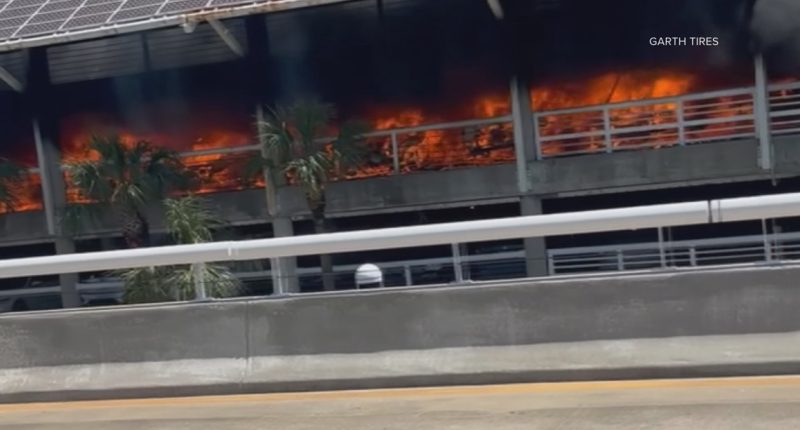Share this @internewscast.com

Our team found not all parking garages are equipped with sprinklers, including garages at major Florida airports.
JACKSONVILLE, Fla. — Following a fire that swept through a parking garage at Jacksonville International Airport, teams are now busy clearing the site of numerous burnt-out vehicles. Meanwhile, airport officials are addressing inquiries regarding the rapid spread of the blaze.
“There are no fire sprinklers,” Jacksonville Aviation Authority Chief Operating Officer Tony Cugno said.
In fact, Jacksonville’s airport doesn’t have sprinkler systems installed in either of its parking garages — and it’s not alone.
Similarly, Orlando and Tampa International Airports also have certain parking structures that lack sprinkler systems. This is because national fire codes, until last year, did not mandate the installation of sprinklers in open-air parking garages.
An assistant vice president for public affairs at Orlando International clarified that Terminal Top Parking and the C Garage do have sprinkler systems. Additionally, a spokesperson for Tampa International mentioned that sprinklers are present on Level One of the Long-Term parking, due to the area being formerly used for refueling rental cars.
The National Fire Protection Association (NFPA) updated its codes in 2023 to mandate sprinkler protection in all new parking garages whether enclosed or open-air.
Victoria Lutz is a senior research project manager at the NFPA’s Fire Protection Research Foundation, its independent research affiliate. She said the change was sparked in part by a 2017 fire in an airport parking structure in Liverpool, England that led the NFPA to research the issue.
“Historically, we believed open garages allowed enough time for firefighters to arrive before flames spread between vehicles,” Lutz said. “But cars are getting larger, with more plastic, bigger fuel tanks and larger batteries.”
The shift in design and materials has made fires more intense and more difficult to contain, according to Lutz.
“Our research found that when sprinklers are present, the fire is usually limited to one car or has a smaller impact, we’re able to control the hazard a lot better,” Lutz added.
While airports like Jacksonville, Orlando and Tampa don’t have sprinkler systems throughout, some do have alternative protections, such as standpipe systems and fire extinguishers placed throughout the facility. But those systems require human intervention.
“So how a sprinkler system works is it’s an automatic system, right? So the sprinkler will activate based on, you know, detection of heat. So, at a certain temperature threshold, the bulb or the activating element of that sprinkler will automatically activate and start to spray water,” Lutz explained.
Tampa Fire Marshal Andrell Miller agrees the updated code reflects modern fire risks, especially with electric vehicles.
“Which was a good reason why the change was made. So, in the event that something happens, it can at least keep it in check until the fire department arrives. Because, of course, electric vehicles, they do burn hotter than the average vehicle,” Miller said.
Still, retrofitting existing garages to include sprinklers isn’t simple or cheap.
“It’s hard to make those changes once the building is already in place,” Miller said. “But we can look at requiring other things. We just have to go through our local ordinance, our local code, and see what we want to implement.”
A spokesperson for Miami International Airport said all of its garages, though built years ago, are fully equipped with sprinkler systems.
Jacksonville officials said they have not yet had discussions about adding sprinkler systems. At Tampa International, airport leaders are working to install new technology called LiDAR (Light Detection and Ranging), which uses lasers to detect fires in their earliest stages.

















